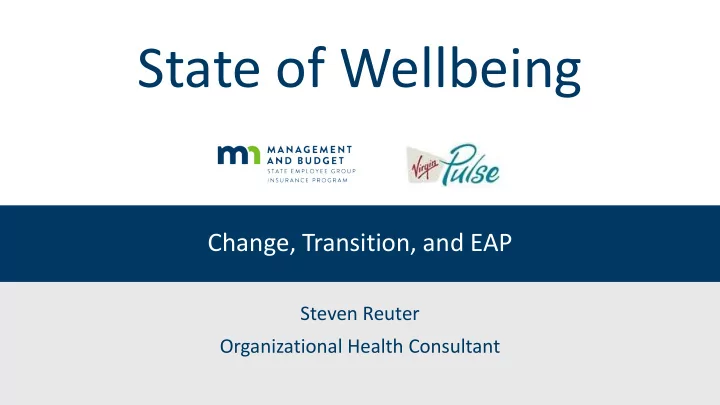

State of Wellbeing Change, Transition, and EAP Steven Reuter Organizational Health Consultant
Change vs Transition Change Transition Human Observable Impact Additional Measurable Work Time- Process bound
Why People Resist Change 1. The risk of change is seen as greater than the risk of standing still 2. People feel connected to other people who are identified with the old way 3. People have no role models for the new activity 4. People fear they lack the competence to change 5. People feel overloaded and overwhelmed 6. People have a healthy skepticism and want to be sure that new ideas are sound 7. People fear hidden agendas among would-be reformers 8. People fear the proposed changes threatens their notions of themselves 9. People fear loss of status or quality of life 10. People genuinely believe that the proposed change is a bad idea
Why People Support Change They expect that it will result in some personal gain . They expect a new challenge as a result. They believe that the change makes sense and is the right thing to do. They were given an opportunity to provide input into the change. They respect the person who is championing the change. They believe it is the right time for the change.
What is Stress? What is Resilience? The body’s response to the Tolerance for discomfort demands made upon it “To be in the midst of noise, Fight or Flight hard work or trouble and still be calm in your heart” “Caring about something that you think you can influence”
Resilience The ability to persist despite challenges, and to bounce back from falls. What supports your resilience?
Characteristics of Resilience • Positivity • Health • Humor • Flexibility • Proactivity • Focus/Purpose • Organization
Resilience Tools 1. Circle of influence 2. Awareness 3. Relationships 4. Health
1. Circle of Influence Circle of INFLUENCE Courage Circle of CONCERN Ser eren enity Clarity Wisd sdom
2. Self Awareness 2. Self Awareness What are you… Thinking? Feeling? Doing? Valuing?
2. Self Awareness Notice how and where you are Take a breath: inhale for 4….exhale for 6 Notice 5 things that you see, hear, feel physically/emotionally Stand, move, feel the support of the floor
2. Self Awareness “Transition is the human side of change.” Endings New Beginnings William Bridges Letting Go, Disintegration Renewal, Reintegrating Neutral Zone Wilderness, Uncertainty
Characteristics of the Neutral Zone Yearning for the past or future Uncertainty, Fear, Doubt Opportunity
2. Self Awareness Your Stress Mindset “Stress is negative and should “Stress is positive and should be avoided” be embraced” • This is unfair • Stress is part of being human • I’m failing • I care how I do • Why happening to me? • What now, what for, what • Who’s to blame? next? People with a more negative People with a more positive mindset experience more mindset have fewer adverse adverse affects of stress affects of stress Kelly McGonigal, Phd
2. Self Awareness Where’s your focus? Ability to Control Factors, Outcomes Not Important and Important and Controllable Controllable Important and Not Important and not Controllable not Controllable Importance (not the same as urgency)
3. Your Relationships “ The surest way out of feeling overwhelmed is through relationship. ” • Be with those you care about • Connect with others. • Be with those who care about • Let someone know that they matter to you. you • Take a step to improve a • Be with those you trust relationship. • If you’re short of options, learn • Use your relationships – ask for how to increase your options help, team up, negotiate (deadlines, e.g.) (Employee Assistance can help)
4. Your Health 4/2/2019 Optional Tagline Goes Here | mn.gov/websiteurl 17
4. Your Health: Practice Self-care Start with you Take a break Find your strengths • If you don’t take • Give yourself • Your individual care of yourself, permission to strengths are you are providing prioritize your unique and aren’t a the world with a wellbeing. We all perfect fit for every struggling version hit walls and run situation or job. of yourself. Those out of energy. Just because we around you When you’re away can do a task, deserve the best from work, doesn’t mean we “you” possible. disconnect and to should . It’s a something away disservice to your from the everyday. customers if you know someone • Remember: your whose strengths mood is just as are a better fit for contagious as the the customer’s common cold. needs. 18
Self-care at work Take walks, especially after difficult meetings. Talk with co-workers about non-work related things. Identify tasks at work that you want to learn more about and improve upon (Build Mastery) Eat lunch away from your desk; outside if possible and it pleases you. 19
Self-care at home Set aside time for something that fulfills you (reading, exercise, listening to music in your favorite chair, talking with a friend on the phone). Make these times sacred. Sleep! At least 7 hours a night. Create a bedtime ritual to help your body relax and sleep peacefully. Eat nutritional foods and drink lots of water. It is amazing the difference in your ability to think and process information when you give your body the correct fuel Attend to your relationships! We are social creatures and require connection 20
What's one thing that you will do differently to support your resilience? Circle of Influence Self-Awareness • Let go of something • Set up a cue for mindfulness • Exercise your gratitude • Yoga muscle Relationships Health • Tell someone that they • Take the stairs matter to you • Set up a sleep routine • Ask for or offer help
What? When? How Often? Who? • What will you do? • When will you do it? • How often? • Who will you tell? How will you track it?
Recommend
More recommend